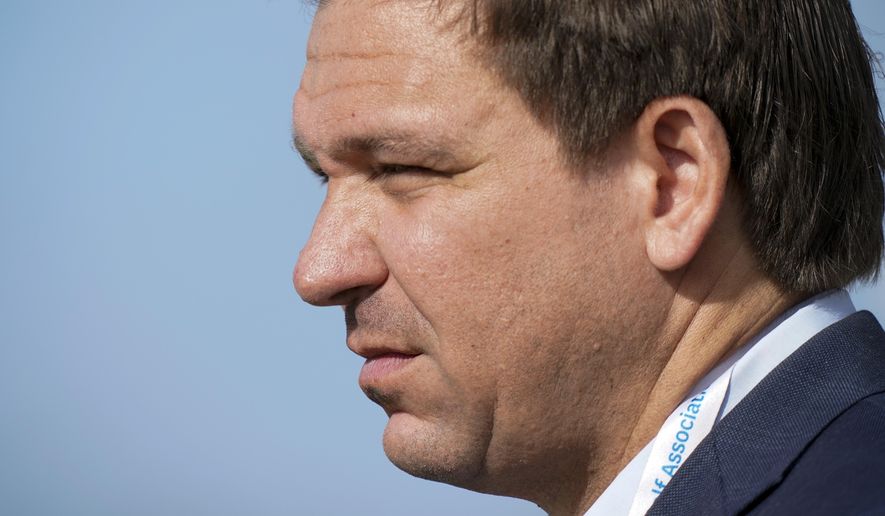Gov. Ron DeSantis on Thursday put his stamp on the debate over critical race theory by getting the Florida State Board of Education to pass a rule barring it from being taught in public schools.
Critical race theory has become a hot-button issue in conservative circles. Republican leaders in several states are trying to keep it out of classrooms, describing it as state-sanctioned racism against White people.
It also is becoming an early litmus test for potential 2024 GOP presidential contenders such as Mr. DeSantis.
“We have to do history that is factual,” Mr. DeSantis told the board before its vote. “If you look at things that have grown out of critical race theory it is much more about trying to craft narratives about history that are not grounded in fact.”
Mr. DeSantis criticized The New York Times’ “1619 Project” that reframes U.S. history with a focus on slavery and racism as the defining characteristic of the American experience.
“The folks who created that said that the American Revolution was fought primarily to preserve slavery,” he said. “Now that is factually false. That is something you can look at the historical record.”
Florida’s board of education unanimously approved the new rule, which said critical race theory distorts history and is inconsistent with state standards.
The rule specifically barred the classroom instruction based on the “1619 Project.”
“Examples of theories that distort historical events and are inconsistent with State Board approved standards include the denial or minimization of the Holocaust, and the teaching of Critical Race Theory, meaning the theory that racism is not merely the product of prejudice, but that racism is embedded in American society and its legal systems in order to uphold the supremacy of white persons,” the rule said.
The subject of critical race theory has gotten more attention as President Biden and progressive Democrats seek to address issues of race and raise questions about the role that racism has played in issues like health care, housing, criminal justice and education.
The basic tenet of critical race theory is that racism extends beyond individual prejudice and is baked into the nation’s legal systems, policies and society as a whole.
Critics say the movement is misguided because it gives ideology more weight than historical accuracy.
Florida’s new rule states that “instruction may not utilize material from the 1619 Project and may not define history as something other than the creation of a new nation based largely on universal principles stated in the Declaration of Independence.”
It also said: “Instruction on the required topics must be factual and objective, and may not suppress or distort significant historical events, such as the Holocaust, the Civil War and Reconstruction, the civil rights movement and the contributions of women, African American and Hispanic people to our country.”
The issue has been polarizing, and passions were on display during the public comment period, with members of the public lining up to criticize and praise the proposal.
Opponents said Mr. DeSantis is channeling Trumpism and trying to score political points as he lays the foundation for a presidential run.
They said the rule seeks to “whitewash” and “candy coat” the nation’s racist history and seeks to “brainwash” students.
At one point, the meeting came to a halt when opponents started chanting “Allow Teachers to Teach the Truth!” and “No Justice, No Peace!”
Kevin Parker, a Black man, told board members the push to ban critical race theory is driven by racism, fear of teaching the “gritty parts of history” and “avoiding the hard conversation for the sake of White fragility.”
“We will not allow you to call our history inaccurate or fake news because you cannot handle the truth,” Mr. Parker told the state board. “You talk about indoctrination. You are indoctrinating children where they are not told the entire story.”
Bobbie O’Connor, a social justice advocate, echoed that sentiment.
Ms. O’Connor said there are historical patterns of racism that are ingrained in the nation’s laws and institutions, and said the “legacies of slavery, segregation and Jim Crow still create an uneven playing field for Black people.”
“I say to you — this is not just a theory,” she said. “It is the plain and simple truth and I believe that students should be told the truth,” Ms. O’Connor said.
Several other attendees agreed with Mr. DeSantis.
“I believe critical race theory is nothing more than cultural Marxism,” said Martin Janowiecki.
“It attempts to separate society into a group of oppressors and the oppressed and the solution from CRT is to simply destroy the institutions of our country and replace them with whatever the people that control the narrative deem best for the people that they want to rule over,” he said.
Reading from her phone, Keisha King, a Black woman who identified herself as a member of Moms for Liberty, said it is “sad that we are even contemplating something like critical race theory where children will be separated by their skin color and deemed permanently oppressors or oppressed in 2021.”
“That is not teaching the truth — unless you think Whites are better than Blacks,” she said.
• Seth McLaughlin can be reached at smclaughlin@washingtontimes.com.




Please read our comment policy before commenting.